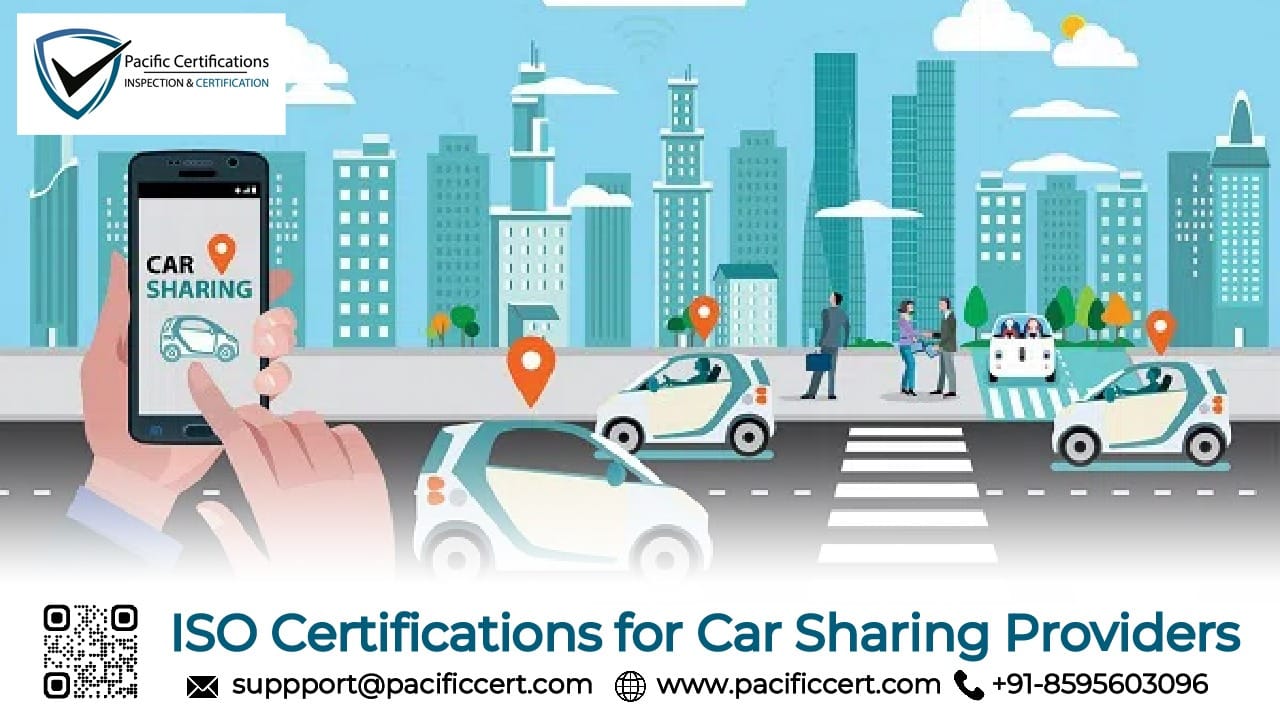ISO Certifications for Car Sharing Business, Requirements and Benefits

Introduction
Car sharing businesses operate in a technology-enabled, safety-critical, and trust-dependent environment where vehicle reliability, data security, user safety, service availability, regulatory compliance, and environmental responsibility directly influence adoption and brand reputation. These businesses manage shared vehicle fleets, mobile applications, booking systems, payment platforms, telematics data, vehicle maintenance, customer support, and urban mobility partnerships.
As cities push for reduced congestion and lower emissions, and users demand seamless, safe, and transparent mobility services, car sharing operators face increasing scrutiny from regulators, insurers, municipalities, and corporate partners. ISO certifications have therefore become an essential framework for car sharing companies to demonstrate structured operations, controlled service delivery, secure data handling, fleet safety management, and long-term operational credibility.
In car sharing, every ride is a trust contract between the platform, the vehicle, and the user.
Quick Summary
ISO certifications provide car sharing businesses with internationally recognized frameworks to manage service quality through ISO 9001, information security through ISO/IEC 27001, privacy protection through ISO/IEC 27701, road traffic safety through ISO 39001, environmental responsibility through ISO 14001, occupational health and safety through ISO 45001, business continuity through ISO 22301, and energy efficiency through ISO 50001. These certifications help car sharing operators improve fleet safety, protect user data, ensure service reliability, and meet urban mobility and regulatory expectations.
For more information on how we can assist your car sharing business with ISO certifications, please contact us at [email protected].
Applicable ISO Standards for Car Sharing Businesses
Below are the most relevant ISO standards applicable to car sharing platforms, fleet operators, and shared mobility service providers:
ISO 9001:2015 - Quality Management System (QMS)
ISO 9001 supports consistent control of vehicle onboarding, booking processes, maintenance workflows, customer support, billing accuracy, and service improvement.
ISO 14001:2015 - Environmental Management System (EMS)
Car sharing plays a role in sustainable urban mobility. ISO 14001 helps organizations manage environmental impacts related to fleet emissions, vehicle lifecycle, waste, and resource use.
ISO 27001:2022 - Information Security Management System (ISMS)
Car sharing platforms process sensitive user data including identities, driving history, location data, payment information, and vehicle telematics. ISO/IEC 27001 ensures secure access controls, monitoring, and incident response across digital systems.
ISO/IEC 27701:2019 – Privacy Information Management Systems
ISO/IEC 27701 helps car sharing businesses manage consent, data minimization, retention, and compliance with data protection regulations related to personal and location-based data.
ISO 39001:2012 – Road Traffic Safety Management Systems
ISO 39001 is highly relevant for car sharing businesses, providing a structured framework to reduce road traffic incidents, manage driver behavior risks, ensure vehicle roadworthiness, and improve overall fleet safety performance.
Click here to find out more applicable standards to your industry
Contact Pacific Certifications for ISO audits and certification for Car Sharing Providers at [email protected] or call +91-8595603096!
What are the Requirements of ISO Certifications for Car Sharing Businesses?
Car sharing operators seeking ISO certification must establish and maintain documented policies, procedures, and records aligned with the selected ISO standards. Key requirements include the following:
ISO 9001:2015 – Quality Management Systems
Define controlled processes for bookings, fleet use, and customer support
Monitor service performance and user feedback
Implement corrective actions and continual improvement
ISO 39001:2012 – Road Traffic Safety
Identify road traffic risks and safety objectives
Implement vehicle maintenance, driver control, and incident response measures
ISO/IEC 27001 & ISO/IEC 27701 – Information Security & Privacy
Identify user, vehicle, and platform data assets
Implement access controls, encryption, and monitoring
Manage privacy risks and regulatory compliance
ISO 22301:2019 – Business Continuity Management
Identify critical platform and fleet operations
Develop continuity and recovery plans
Tip:Start by mapping the full car-sharing journey—from user registration and booking to vehicle access, driving, return, billing, and incident handling—against ISO requirements to identify safety, data, and service gaps early.
For further information on how we can assist your car sharing business with ISO certifications, contact us at [email protected].
What are the Benefits of ISO Certifications for Car Sharing Businesses?
ISO certifications are suitable for free-floating car sharing, station-based sharing, corporate fleet sharing, and mobility-as-a-service platforms. Key benefits include:
Improved fleet safety and reduced accident risk, protecting users and assets.
Stronger protection of user and location data, building platform trust.
More consistent service quality and vehicle availability, improving user experience.
Enhanced credibility with cities, insurers, and partners, supporting expansion.
Better environmental performance and sustainability reporting, aligning with ESG goals.
Improved readiness for audits, tenders, and regulatory reviews, reducing risk.
Car sharing is becoming a core component of urban mobility strategies worldwide. Industry research indicates that the global car sharing market is projected to exceed USD 20 billion in a few years, driven by urbanization, rising vehicle ownership costs, and government incentives for shared mobility. Cities increasingly require mobility operators to demonstrate safety, data protection, and environmental accountability.
Benchmarking shows that car sharing operators implementing structured safety, security, and service management systems achieve 20–35% reductions in vehicle incidents, service disruptions, and user complaints. ISO-aligned governance—particularly ISO 39001, ISO/IEC 27001, and ISO 9001—is expected to become a baseline requirement for car sharing companies partnering with municipalities, corporate fleets, and public transport ecosystems.
How Pacific Certifications Can Help
Pacific Certifications, accredited by ABIS, acts as an independent certification body for car sharing businesses by conducting impartial audits against applicable ISO standards. Our role is to objectively assess whether documented management systems and operational practices conform to international ISO requirements, based strictly on verifiable evidence and records.
We support car sharing operators through:
Independent certification audits conducted in accordance with ISO/IEC 17021
Practical assessment of real fleet, safety, and digital governance controls
Clear audit reporting reflecting conformity status and certification decisions
Internationally recognized ISO certification upon successful compliance
Surveillance and recertification audits to maintain certification validity
If you need support with ISO certification for your car sharing business, contact us at [email protected] or +91-8595603096.
Author:Ashish
Ready to get ISO certified?
Contact Pacific Certifications to begin your certification journey today!
Suggested Certifications –
Read more: Pacific Blogs
